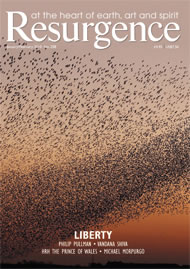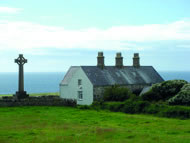According to local legend 20,000 saints are buried on Bardsey. Certainly, the island’s few remaining residents often dig up human bones when tending their vegetable patches. And it’s not hard to believe the legend at night, when the moon glows through the snaggled ruins of the medieval abbey, and the ghostly cry of the Manx shearwater splits the dark skies. But Bardsey is a holy island, one of a handful lying off the Celtic fringe of Britain, and despite the bones I felt I was among friends.
The island lies stranded, a smooth-backed hump of land like a beached whale, just off the tip of Wales’s Llyn peninsula. Across the sound to the east lie the blue peaks of Snowdonia; to the west, on a clear day, Ireland’s Wicklow Mountains. But clear days are rare, for even in high summer Bardsey can be a wild, windswept spot. The surrounding seas are notoriously treacherous, and regularly the boat that takes people to and from the island is cancelled. Which is exactly why I wanted to be here in the first place.
Travel today has become too easy. Despite the nightmare of airports and crowded motorways, we are pretty sure that we will reach our destination sooner or later. Today it is the ‘destination’ that matters, and the romance – and peril – of the journey to reach it has gone. But travelling to Bardsey, or Ynys Enlli in lyrical Welsh, is still an adventure, as would-be visitors are very often stranded on the mainland, or on the island itself. As with medieval pilgrimage, the journey is as significant as the destination. Not surprising then that in the Middle Ages three pilgrimages to Bardsey were deemed equal to one to Rome, and thousands died travelling here, or came here to die amongst the saints.
And even if I was not coming here to die, or undertake a religious quest, I was doing the 21st-century equivalent. I was here to retreat from the world. And what better place to do so than an island only 2.5 kilometres long, where I was surrounded by not people but flowers: squill, thrift and heather carpeting the meadows, smothering the island’s only hill, clambering over the crumbling stone field walls? Here I could really feel alone.
Alone but not lonely. The word ‘island’ derives from the Latin insula, also the root of our English word ‘isolation’. Islands – and isolation – have attracted seekers of spiritual truth, from the earliest times. The Celtic Christians came to the wildest, most inhospitable spots in Britain, such as Bardsey, to live and to pray. On islands such as this you feel vulnerable – to the sea, to the elements – but you also feel safe within its watery confines. You can’t get lost on Bardsey, but you can lose yourself.
And so St Cadfan came here to escape his frenetic 6th-century world and build a monastery, followed in the 14th century by the Augustinians, who rebuilt it. Only the shell of the tower remains now, with windows and roof open to the wind, rain and stars, but it is still a profoundly spiritual place. Inside is a small altar, with a cross scratched into the stonework, and beyond, all you can hear is the roar of waves, and screech of seabirds.
I stayed in a farmhouse overlooking the abbey, one of the seven that the Bardsey Island Trust, which manages the island, lets weekly to visitors. There’s no electricity or mains water on Bardsey, so each day I washed in a bowl of rainwater from the outdoor tank, and each evening I read by the light of a gas-fired lamp. There are no keys for the front door, and outside is a compost toilet. You have to bring all your food for the week with you from the mainland, with only honey and the occasional lobster available from the farmer, but there’s also marjoram, parsley, fennel, sage and borage which you can pick from the garden and add to your cooking pot. So in this place of deep simplicity, I ate simply – hunks of bread and cheese for lunch, pasta with tomato sauce for supper. Here, my appetites weren’t for sophisticated things.
And it soon became apparent to me that when you have to boil your water for washing each morning, and light the lamps and candles every evening, you are forced to slow your pace of life. On a tiny island where nothing is available at the touch of a button, there are no TVs or radios to distract you, and there is nowhere to rush off to, you are left with time and space to think, ponder and just ‘be’. In a place where there is hardly anything to buy, money – and its sidekick materialism – becomes meaningless. And when your door is unlockable you may as well fling it wide open and trust in our fellow human beings, and welcome them into your house – and your life.
A century ago, everyone in Britain lived like this. And until the early 20th century Bardsey was a self-sustaining economy and ecosystem. According to Tomos o Enlli, whose memories of life on the island a century ago are recorded in a charming book, Tomos the Islandman, the only commodities islanders imported from the mainland were tea, sugar, tobacco, matches and beer. The economy may rely on visitors too now, but the island’s ecosystem is still alive and kicking, which is why so many birds pass by on their annual migrations: choughs, oystercatchers, herons and peregrine falcons stop here.
It is also perhaps why, according to 13th-century Welsh historian Giraldus Cambrensis, “nobody dies here except from extreme old age,” putting the islanders’ renowned longevity down to the good island air and spiritual health. For me, the island air was certainly invigorating, and I spent many hours wandering the only hill, following sheep paths winding through the bracken, spying the seals heaving themselves onto the shore to bask in the midsummer sun. And watching the pink thrift quivering in the wind that blasted the island, driving the few hawthorns hardy enough to survive here sideways into permanently bent, skeletal shapes like stooped old men.
But the appeal of Bardsey isn’t universal. It doesn’t appeal, for example, to those who like luxury on their holidays, if you define luxury by the number of mod cons you’ll find. It also doesn’t appeal to those who love to be in control: of Nature, events, even time. For on Bardsey you are compelled to slow down and to move at Nature’s, rather than people’s, pace. But despite, or perhaps because of, these privations the island is hugely popular, and the seven houses are booked months in advance.
For all its rainswept, Atlantic climate Bardsey reminded me, strangely, of the desert – another of my favourite places. To me, like the desert, Bardsey is a ‘thin place’, where the spirit of Nature can be keenly felt. To another visitor, who signed themselves ‘a Welsh pilgrim’ in the visitors’ book in my farmhouse, Bardsey was “an island of peace in a mad world”. I couldn’t have put it better myself.








